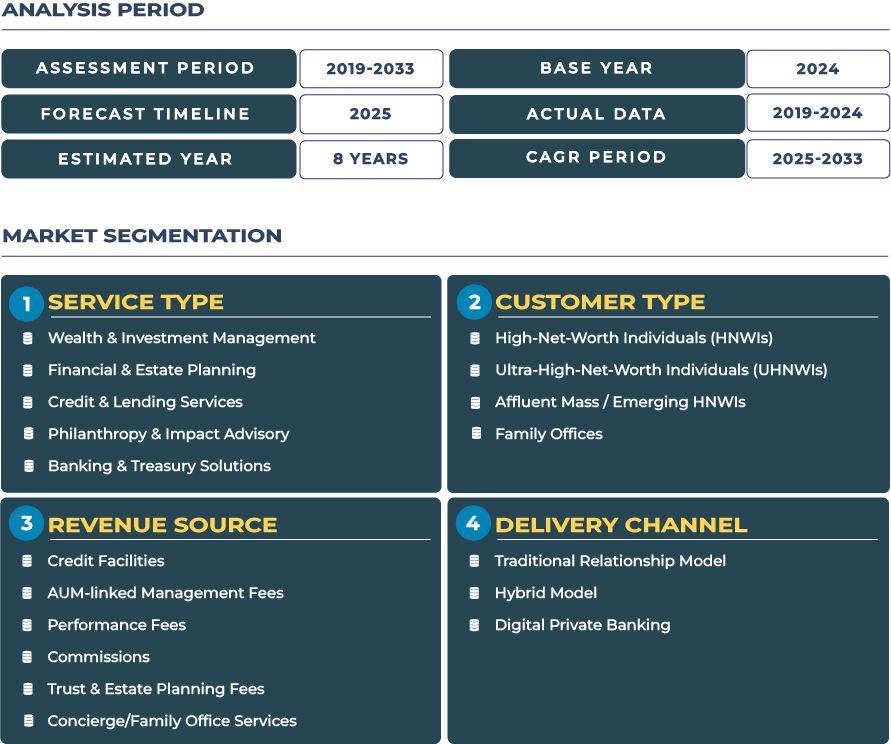Market Outlook: Navigating the Strategic Path for the Benelux Private Banking Ecosystem Through 2033
The market outlook for Benelux private banking is defined by persistent structural strength and measured growth. From an estimated USD 19.7 billion in 2025 rising to USD 24.3 billion by 2033 at a CAGR of 2.7%, the outlook is healthy albeit conservative. The region’s wealth-management needs are more niche than mass-market: high-net-worth and ultra-HNW families seeking global advisory, cross-border structuring, real-asset diversification and integrated treasury solutions fuel the demand side.
Note:* The market size refers to the total revenue generated by banks through various services.
Despite the modest growth rate, the Benelux region offers distinct strategic advantages for private banking firms. Luxembourg’s mature fund-servicing infrastructure, Belgium’s dense entrepreneurial wealth base and the Netherlands’ international connectivity enable private banks to structure cross-border portfolios, hub-based advisory services and liquidity-efficient private banking models. At the same time, macro factors-such as rising regulatory complexity (e.g., European Central Bank supervisory pressures), competition from global wealth centres, and cost-to-serve escalation-mean that growth will increasingly depend on operational efficiency, digital platforms and deeper client segmentation rather than broad expansion. As such, the path to capture the 2.7% CAGR lies in value-creation via cross-border advisory, tailored next-gen wealth services and ecosystem orchestration.
Growth Catalysts & Structural Constraints: What Propels and What Limits the Benelux Private Banking Market
The Benelux private banking market is propelled by several core drivers. Firstly, the region benefits from significant pension-fund and institutional assets, which create spill-over wealth and liquidity that private banks can service with credit, treasury and advisory solutions. Secondly, the cross-border UHNW wealth hubs-particularly Luxembourg and Brussels-serve as storage and advisory locations for globally mobile families, driving demand for integrated wealth-management services. Thirdly, regulatory transparency and tax-efficiency in the Benelux jurisdictions act as attractors for wealth from more opaque or less-favourably regulated jurisdictions, reinforcing the region’s position as a private-banking super-niche.
Nevertheless, the market faces several constraints. Market saturation in core private banking hubs means incremental growth is harder to achieve; most players already serve established affluent clients, which limits new-money inflows. Domestic wealth-base size in each individual jurisdiction is smaller relative to major markets like Switzerland or the U.K., constraining scale economics. Additionally, elevated compliance and ESG-cost burdens (especially with EU-driven transparency, sustainability disclosure and anti-money-laundering regulations) squeeze margins and inflate cost-to-serve. These factors combine to moderate growth and emphasise the importance of strategic differentiation and service depth over volume expansion.
Trend-Vectors and Opportunity Windows: Digital ESG Tools, Family-Office Digitisation and Fintech Integration in Benelux Private Banking
Emerging trend-vectors: The Benelux private banking sector is witnessing distinct trend-vectors. Digital wealth-platform adoption is accelerating: private banks are investing in open data-sharing, cloud-native advisory tools, integration of payments/treasury and mobile engagement platforms. ESG-portfolio and impact-advisory offerings are becoming more prominent-wealthy clients in the region expect integration of sustainability metrics, green investment vehicles and philanthropic structuring within their private bank relationships. Family-office digitisation is also a trend: owners and heirs expect sophisticated dashboards, multi-asset reporting, global credit overlays and alternative-investment access aligned with their heritage portfolios.
Opportunity windows for growth: Private banks in Benelux can exploit key opportunity windows. Firstly, regional fintech integration: alliance with fintechs enables banks to scale wealth-services for next-generation wealthy clients and offer lower-cost access to advisory, treasury and lending. Secondly, cross-market private banking: targeting cross-border clients from neighbouring jurisdictions (Germany, France, U.K.) with Benelux-based offering of fiscal efficiency and global platforms offers growth potential. Thirdly, ESG advisory is a strong differentiator-wealthy clients in the region increasingly look for impact investing, green real-estate exposure and sustainable family-office frameworks; private banks that build dedicated ESG desks and thematic wealth-vehicles will capture incremental share.
Competitive Landscape: Strategic Realignment and Platform-Orchestration in the Benelux Private Banking Market
The competitive terrain in Benelux private banking is becoming increasingly strategic. A leading participant is Delen Private Bank (Belgium), which has built scale through discretionary-asset management, a strong digital footprint and ambitious expansion into the Netherlands. Broadly, strategies being deployed across the region include segmentation-targeting ultra-HNW and next-gen affluent clients with customized propositions; platform integration-moving beyond pure advisory toward full wealth-ecosystem offerings that combine investment, credit, treasury, payments, and philanthropy; and partnerships and acquisitions-particularly in fintech, alternative-asset platforms, and cross-border advisory to enhance capabilities and capture mobility wealth. As global competition intensifies and regulatory pressure mounts, Benelux private banks must transition from legacy advisory models to agile, ecosystem-oriented offerings to sustain differentiation and growth.







